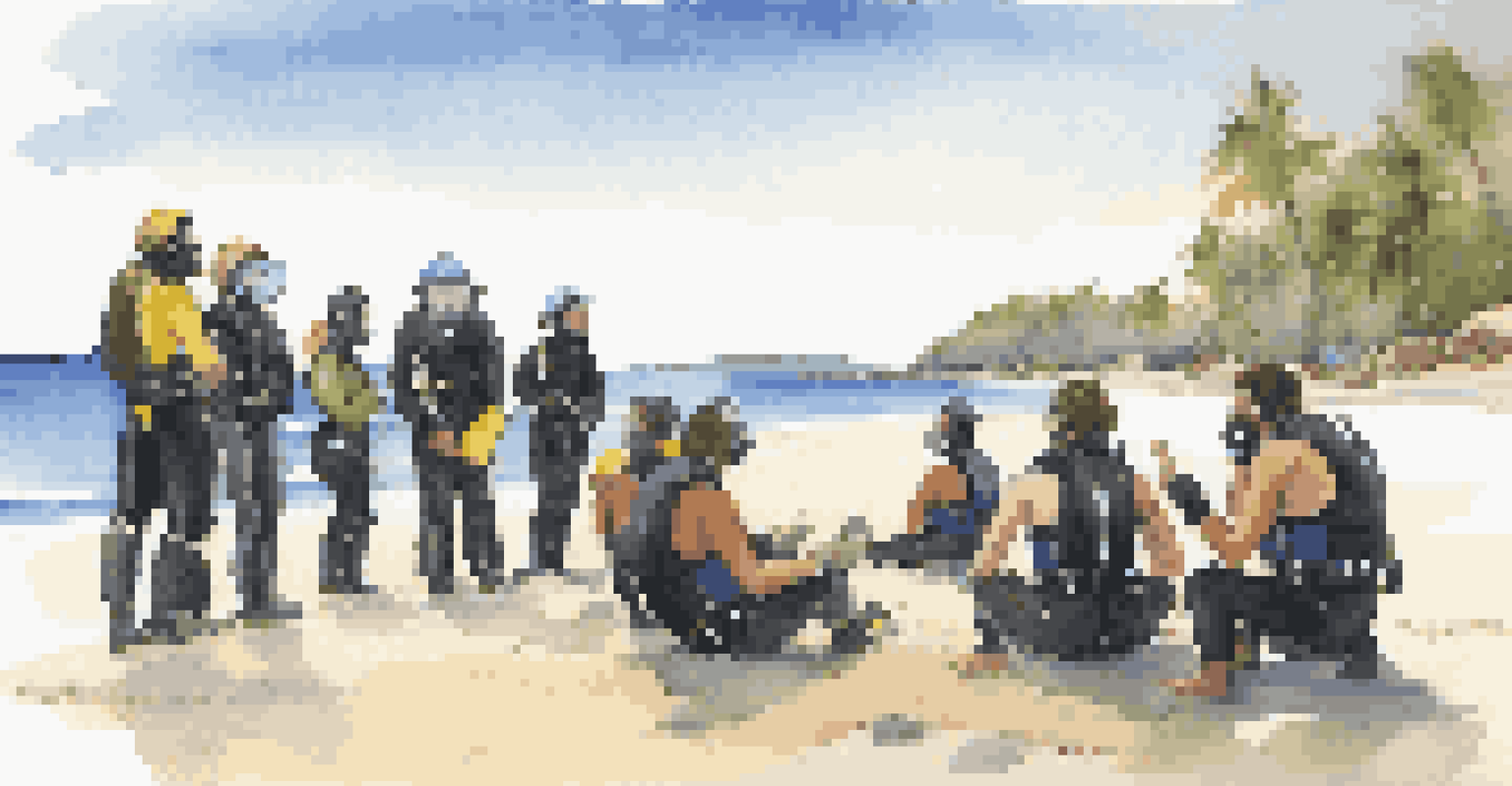Scuba Diving Regulations: What Divers Need to Know

Understanding the Importance of Scuba Diving Regulations
Scuba diving regulations are essential for ensuring the safety of divers and the protection of marine environments. These guidelines help prevent accidents and injuries while promoting responsible diving practices. By adhering to these regulations, divers can enjoy their underwater adventures with peace of mind.
The sea, once it casts its spell, holds one in its net of wonder forever.
The rules set forth by organizations like PADI and NAUI provide a framework for safe diving experiences. They cover everything from equipment standards to training requirements, tailored to different diving conditions. Ultimately, these regulations are designed not just for individual safety, but for the well-being of the entire diving community.
Imagine diving without any rules; it would be like driving a car without traffic laws—chaotic and dangerous. Regulations help create a structured environment where divers can focus on enjoying the beauty beneath the waves, knowing that safety is prioritized.
Know Your Certification Requirements
Before you dive into the deep blue, it's crucial to know the certification requirements in your area or the region where you plan to dive. Different locations may have varying regulations regarding the level of certification needed. For instance, some dive sites require advanced certifications for deeper dives, while others are suitable for beginners.

Certification agencies like PADI and SSI offer courses that help divers gain the necessary skills and knowledge. These certifications not only enhance safety but also ensure that divers are equipped to handle emergencies. Always carry your certification card when diving, as many operators require proof before allowing you in the water.
Importance of Scuba Diving Regulations
Scuba diving regulations ensure the safety of divers and protect marine environments by promoting responsible practices.
Think of your certification as a driver's license for diving; it proves you have the training to navigate underwater safely. By knowing and respecting these requirements, you contribute to a safer diving environment for everyone.
Check Local Laws and Regulations
Diving regulations can vary significantly based on location, so it's vital to familiarize yourself with local laws before diving. This includes understanding protected marine areas, restrictions on certain activities, and any necessary permits. Ignoring these regulations can result in hefty fines or damage to sensitive ecosystems.
Protect the ocean, and it will protect you.
For example, certain dive sites may have restrictions on spear fishing or collecting marine life. Local authorities often implement these rules to preserve biodiversity and protect endangered species. By being aware of these regulations, divers can play an active role in conservation efforts.
Think of it as being a good guest in someone else's home; respecting the rules helps maintain the beauty and integrity of the underwater world. Always do your research before your dive trip to ensure you're diving responsibly.
Equipment Regulations: What You Need to Know
Diving equipment must meet specific safety and performance standards to ensure your safety underwater. Regulations often stipulate that gear should be regularly inspected and maintained, which is crucial for preventing accidents. Always check that your equipment complies with the latest safety standards set by recognized organizations.
Additionally, be aware of local regulations regarding the type of equipment allowed during dives. For example, some areas may prohibit certain types of buoyancy control devices or require specific safety gear. Understanding these rules helps ensure that your gear is not only safe but also suitable for the conditions you'll encounter.
Know Your Certification Requirements
Understanding local certification requirements is crucial for safe diving, as they vary by location and dive site.
Consider your diving equipment as your safety net; it’s what keeps you safe while exploring the unknown. By adhering to equipment regulations, you not only protect yourself but also enhance the overall diving experience.
Diving Insurance: Why It’s Essential
Having diving insurance is often overlooked but is a critical aspect of diving regulations. This type of insurance covers emergency medical expenses, evacuation, and even trip cancellations due to diving-related incidents. It’s essential to have a plan in place, especially when diving in remote locations.
Many dive operators require proof of insurance before allowing you to dive, as it protects both you and the operator. This requirement can vary by region, so always check ahead of time. Investing in diving insurance offers peace of mind, knowing that you’re covered in case of unexpected incidents.
Think of diving insurance as a safety parachute; it’s there to catch you if something goes wrong. By prioritizing this aspect of diving regulations, you safeguard your adventure and well-being underwater.
Environmental Regulations: Protecting Our Oceans
Environmental regulations aim to protect marine ecosystems from damage caused by diving activities. These rules often include guidelines on how to interact with marine life and restrictions on where divers can go. Following these regulations is vital for preserving the beauty of our oceans for future generations.
For instance, many regions prohibit touching or disturbing coral reefs, as they are sensitive ecosystems that take years to recover from damage. By respecting these regulations, divers can help minimize their impact on marine life and promote sustainable diving practices. This not only enhances the diving experience but also fosters a culture of conservation.
The Role of Dive Operators
Dive operators are essential for ensuring compliance with regulations, providing safety briefings, and maintaining equipment.
Picture yourself as a guardian of the ocean; by following environmental regulations, you contribute to the health of underwater habitats. Embracing responsible diving practices is essential for our oceans’ future and the enjoyment of divers everywhere.
Emergency Protocols: Know What to Do
Every diver should be familiar with emergency protocols, as they are a crucial part of diving regulations. Knowing what to do in case of an emergency can save lives and prevent panic. Common protocols include recognizing signs of decompression sickness and having a plan for equipment failure.
Dive training courses often cover these emergency procedures, but it’s a good idea to review them regularly. A buddy system is also essential; communicating with your dive partner about emergency plans can make a significant difference. Remember, being prepared is key to a safe diving experience.

Think of emergency protocols as your diving safety manual; having it in mind allows you to react swiftly and calmly when faced with unexpected situations. By understanding and practicing these protocols, you not only keep yourself safe but also ensure a more enjoyable diving experience.
The Role of Dive Operators in Regulation Compliance
Dive operators play a pivotal role in ensuring compliance with scuba diving regulations. They are responsible for creating a safe environment for divers, offering well-maintained equipment, and providing knowledgeable guides. Choosing reputable dive operators who prioritize safety and adhere to regulations is essential for any diver.
Many operators also require divers to sign waivers and provide proof of certification, which helps ensure everyone is aware of the regulations. Additionally, they often conduct briefings before dives to educate divers about local rules and safety practices. This proactive approach contributes to a safer diving community.
Think of dive operators as your safety net; they help bridge the gap between you and the underwater world. By collaborating with responsible operators, you enhance your diving experience while supporting a culture of safety and conservation.